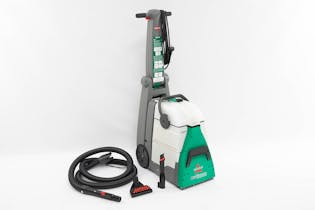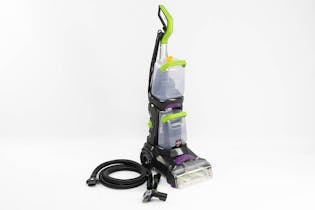Carpet washers
Find the best carpet washer for your home with our buying guide and test results for 5 current and 5 discontinued models.
A good carpet washer can give new life to a carpet with years of dirt and sweat build-up. But some simply won’t clean your carpet and others can make your carpet overly wet and vulnerable to mould.
Over time, carpets build up with grime that isn’t removed through regular dry vacuuming. That build-up is likely to be more if you have pets at home. Buying or hiring a good carpet washer can remove a lot of that grime.
But some models are a waste of time or leave your carpet overly wet. Check out our test results to see which perform best and leave your carpet driest.
What is a carpet washer?
A carpet washer – sometimes called a carpet shampooer or carpet cleaner – is a machine that’s sole purpose is to shampoo your carpet (and upholstery, in most cases). It squirts water and detergent into the carpet, agitates it with a spinning brush, then sucks the dirty water back out.
A carpet washer is not a wet & dry vacuum. Wet & dry vacs are designed to be used for vacuuming up dirt (dry) and spills (wet). Most carpet washers are not suitable for dry vacuuming, and a wet & dry vac won’t shampoo your carpet.

Types of carpet washers
- Domestic carpet washers are suitable for use at home. They’re typically smaller and lighter than commercial carpet washers, with smaller water tanks.
-
Commercial carpet washers can be used at home, but they’re also
suited to larger jobs and more frequent use. These are the models
you’ll find available for hire. Some commercial machines have
different warranty periods for domestic and commercial use.
What to consider before buying a carpet washer
Should you buy or hire?
If you’ve got the storage space and will wash your carpets and upholstery frequently, it’ll be convenient to have a carpet washer at home. Otherwise, you can hire a commercial carpet washer for as little as $40 for 4 hours. Not all hire machines are equal, though. Check our test results to compare models.
Stain removal
Most carpet washers don’t do a good job of tackling stains. They typically require specialist cleaning treatments. Only one model we tested performed well, so make sure you compare test results if stain removal is important to you.
Residual dampness
If your carpet stays wet for too long, it can grow mould and develop a musty smell. It can also get water stains or brown stains from the carpet backing. Our test results show which models have the shortest carpet drying times.
Tools
If you want to clean couches and car seats or similar, choose a model with an upholstery tool. A crevice tool is handy too, for getting into narrow spaces. Most models also have a brush tool, which is sometimes called a ‘deep reach’ or ‘tough stain’ brush tool. And some have a hard floor cleaning head.
On-board storage
Some models have on-board storage. This means tool attachments don’t have to be carried or stored separately – they’re always right where you need them.
Water tank capacity
Small water tanks require emptying and refilling several times when cleaning larger areas. But the large water tanks typical of commercial grade carpet washers are heavier when full and may be awkward to empty.
Weight
Models with large water tanks are heavier than smaller models. Water weighs about 1kg per litre. That means a machine with an 8L tank will be carrying an extra 8kg in water on top of the machine’s weight. It’ll require more effort to move and carry up and down stairs than a smaller machine.
Reach
Carpet washers with more reach allow you to clean more of your house before having to move power points. Power cord and handle lengths vary. Our test measures the total distance from the power point to the cleaning head.
Noise
Some carpet washers are especially noisy. Consider ear protection for models that make 80dBA of noise or more – we think ear protection is essential at 85dBA and above. Our test accurately measures noise levels at the user’s position.
Warranty
Warranty periods vary, typically from one to three years. And some manufacturers’ warranties are not transferable, so they’re not valid if you buy or sell the machine secondhand.
Tips for using a carpet washer
- Prepare your carpet. Clear the area and thoroughly vacuum your carpet. But don’t use a carpet washer for dry vacuuming – use a standard vacuum cleaner instead.
- Don’t use overly hot water in the clean water tank. Doing so could damage the machine and void your warranty. Check the user manual – most take water 40–60°C.
- Use the manufacturer’s recommended cleaning solution. Others may stain or bleach your carpet, damage the machine and/or void its warranty. There are also different solutions for cleaning carpet and upholstery.
- Dilute concentrated cleaning fluid as the manufacturer directs. Insufficient dilution could make a foamy mess. It might then be difficult to remove the excess detergent.
- Avoid over-wetting the carpet and suck out as much moisture as you can. Go over the carpet slowly in vacuum mode several times after cleaning. It’ll shorten drying time, reducing the chance of stains, mould and musty odours developing.
- Don’t put furniture on the carpet until it’s completely dry. Otherwise, the furniture might stain your carpet.
Buying a secondhand carpet washer
Under the Electricity Act, all electrical appliances for sale must be safe, whether they're new or secondhand, bought privately or from a dealer.
You might save money buying secondhand, but there are some things to check before you hand over your cash:
- Type of machine: Domestic carpet washers are usually smaller and lighter than commercial models, with smaller water tanks. However, a commercial carpet washer bought secondhand may have a longer life if it’s only been used domestically, as this type is suited to heavy use.
- Brand and model: Check our carpet washers test results for the current and discontinued models we’ve tested to see how they performed in testing. We can’t test every model on the market, but one brand clearly stands out in our carpet washers tests.
- Features and tools: Check whether the carpet washer has the features and attachments you want. Our test results record which tools are included with each model and whether there’s on-board storage. We also record tank size, maximum reach, weight and noise.
- Condition: Does the machine look clean and tidy? Check all components for cracks, dings or excessive scratches. Are the water thanks clean? Is the hose in good condition? Is the cleaning head clean? Check the whole length of the power cord and the plug for any damage or signs of rough handling.
- Age and usage: Ask the seller how old the carpet washer is and how often it’s been used. A machine that’s under 5 years old that’s been looked after and used moderately or infrequently is worth considering. Has the seller owned the machine from new? Has it ever been used commercially? Is the user manual available?
- Cleaning, maintenance and repair history: Ask about the carpet washer’s maintenance history. Has it been cleaned regularly? Have necessary maintenance tasks been completed? Have any major repairs been required?
- Price and guarantee: Compare the asking price with the prices of similar models on the market. If you buy from a secondhand dealer (including one listed as “in-trade” on Trade Me), you're protected by the Consumer Guarantees Act. If you buy privately, you're not – but you might find cheaper deals. Also be aware that some manufacturers’ warranties aren’t transferable to a secondhand buyer.
- Check it works: It may not be practical to have a full test run, but at least turn on the machine to check it powers up properly before you part with any money.
We’ve recently added discontinued models to our test results, so you can check how older carpet washers we’ve tested perform, which you might be able to buy secondhand. In the filters section of our carpet washers Compare page, choose “Discontinued” in the “Availability” drop-down menu. You can also “Show all” if you want to compare current models against discontinued models.

We've tested 10 carpet washers.
Find the right one for you.
Bissell

Bissell

Hoover
